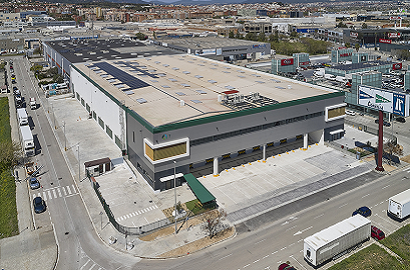Spanish logistics space demand to grow 15% by 2030

The industry will need to mobilise between 1.4 and 1.9 million square metres in Europe for this activity.
E-commerce is still untapped in Europe, according to real estate investor Prologis, which associates its growth with the demand for land for logistics space and even the redefinition of the industry on a global scale. This is evidenced by the title of Prologis Research’s latest report: ‘The e-commerce boom is not over: implications for real estate logistics’.
The argument is based on the fact that e-commerce in continental Europe has an average share of 10% compared to 32% in the UK. That’s why a significant rate of growth can be expected throughout the continent, and specifically in Spain. Expectations of demand for logistics-related land in Spain for 2030 point to a growth of 14.7% compared to the 13.4% that the study calculates as the average for Europe.
This expected growth in demand for logistics-related land entails the need to mobilise between 1.4 and 1.9 million square metres of space in Europe for logistics activity over the next five years.
Possible regulatory change
Another aspect analysed in the report is the current debate on the possible review or elimination of the de minimis thresholds, which indicate the amount above which international transactions are taxed. This debate is leading to changes in e-commerce logistics to try to anticipate possible regulatory change.
In Spain, large platforms already account for 34% of online orders. Companies like Shein, AliExpress and Temu rely on built-to-order models with fast air freight shipping that could be affected by these changes. Although only a small share of imports is affected, this could result in many shipments being transported by sea, longer delivery times and increased storage needs.
The rise of these platforms has already led to changes in distribution models in recent years. These include the prioritisation of logistics locations that are near urban centres, well-connected and close to the consumer, and which guarantee same-day or next-day deliveries. They are in this way responding to their customers’ expectations, given that in 2024 70% demanded 24-hour delivery and 76% wanted a free returns service.
Efficiency of logistics assets
Another trend that has been consolidated in recent years is the search for energy-efficient logistics buildings that consume renewable energy and ensure carbon-neutral operations. Sustainability has indeed become a requirement for e-commerce and last mile companies in general. They also value other factors, such as charging stations for electric vehicles and energy-saving LED lighting systems.
As Cristian Oller, Head of Asset Management for Southern Europe at Prologis, explained, e-commerce “continues to experience strong growth in continental Europe, especially in Spain, where it still has great potential for further development. Faced with this dynamic and the scarcity of available land, logistics operators must adapt their models to offer more sustainable platforms closer to urban centres. Increasing penetration rates are driving companies to rethink their supply chains to speed up deliveries, thereby increasing the demand for well-located logistics space.”
Photo: Prologis




